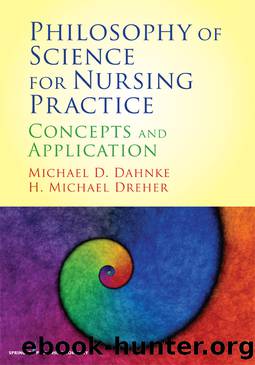Philosophy of Science for Nursing Practice by Dahnke Michael D.;Dreher H. Michael;H Michael Dreher Phd Rn;

Author:Dahnke, Michael D.;Dreher, H. Michael;H Michael Dreher Phd, Rn;
Language: eng
Format: epub
Publisher: Springer Publishing Company, Incorporated
Published: 2011-03-24T00:00:00+00:00
Theory and Reality
Evolution is only a theory. It is not a fact.
STATE OF OKLAHOMA, 2003,HOUSE BILL HB 1504
JUST A THEORY
âBut isn't evolution just a theory?â It is not unusual to hear such a question when the subject of evolution arises. It is an interesting question, as there is much implied behind it. First of course it is largely intended as a rhetorical question and hence not a real question but an implicit statement: âEvolution is just a theory.â If we remove the word âjust,â it becomes a relatively trivial statement, as it is common knowledge that evolution is a biological theory. âJustâ is clearly an important word in this statement then. It implies a lack of something, a âmere-ness,â being less than in some way. Less than what? When prodded, the answer provided is that it is merely a theory rather than a âfact.â The word âfactâ carries a lot of weight, holds an elevated sense of epistemic significance, whereas the word âtheoryâ for many people seems to hold little epistemic significance. Part of the problem is the equivocal nature of the term âtheoryâ in colloquial English. It is used in various fields and studies and likely can be given a unique definition for its use within each. For some reason the epistemically weaker senses of these seem to stick with many in the nonscientific world, leaving them to conceive of scientific theory as nothing more than speculation, a guess, an unsupported âjust-soâ story.
On the other hand, âfactsâ are seen by many as epistemically superior, as true in an absolute sense. Of course, many don't recognize that âfactâ is a highly equivocal term in our language. One interesting difference in meaning is that at times it is understood, as alluded above, as referring to that which is true and as referring to that which actually exists. At other times, it can be understood to refer to what is merely alleged to be true and to exist, but in actuality may or may not. Even if we univocally accept the former sense as the meaning of âfact,â other problems arise. To say that a fact is true or refers to what actually exists is merely an analytic truth; it is true by definition. What such a claim elides is what the appropriate or adequate means of determining what does and what does not qualify as a fact. Without such an understanding, the accusation that a theory is just a theory and not a fact is vacuous.
But not only vacuous, such an accusation is also misguided, as it appears to misconceive or misinterpret the meaning of terms like âfactâ and âtheoryâ within the contexts of scientific investigation and scientific knowledge. Within the context of science, those things usually referred to as âfacts,â are actually not very interesting. âFactsâ are typically observations. They are particular and limited: On such and such a date at such and such a time water boiled at 100°C at sea level. A fact such as this tells us nothing about water in general, how it will behave at other times in other places.
Download
This site does not store any files on its server. We only index and link to content provided by other sites. Please contact the content providers to delete copyright contents if any and email us, we'll remove relevant links or contents immediately.
Elizabeth Is Missing by Emma Healey(1562)
1610396766 (N) by Jo Ann Jenkins(1561)
Economics and Financial Management for Nurses and Nurse Leaders, Third Edition by Susan J. Penner RN MN MPA DrPH CNL(1442)
McGraw-Hill Nurses Drug Handbook by Patricia Schull(1395)
Cherry Ames Boxed Set, Books 1 - 4 by Helen Wells(1329)
The Language of Kindness by Christie Watson(1299)
NCLEX-RN Prep Plus 2019 by Kaplan Nursing(1298)
Home. by Sarah Graham(1296)
Spiritual Midwifery by Ina May Gaskin(1274)
Cherry Ames, Student Nurse by Helen Wells(1270)
Cherry Ames Boxed Set, Books 5 - 8 by Helen Wells(1231)
Whoever Tells the Best Story Wins: How to Use Your Own Stories to Communicate with Power and Impact by Annette Simmons(1227)
Cracking the Nursing Interview by Jim Keogh(1214)
1476763445 by Liz Fenton(1174)
Getting Started with Arduino by Massimo Banzi(1132)
Dementia by June Andrews(1123)
Children's Medicines by Edward A. Bell(1094)
Cherry Ames, Army Nurse by Helen Wells(1077)
Shadows of the Workhouse: The Drama of Life in Postwar London by Jennifer Worth(1051)
